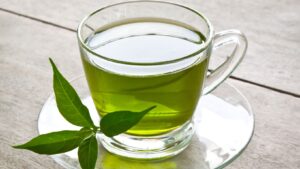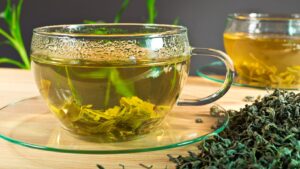Steeped in history and culture, tea isn’t just a comforting beverage; it’s also a potential ally in the fight for better lung health. From green to black, from oolong to herbal, each variety offers a unique blend of beneficial compounds known for their health-boosting properties.
Imagine sipping on a warm cup of tea that doesn’t just soothe your senses but also works wonders for your lungs. Intriguing, isn’t it? This article delves into the science-backed benefits of tea, specifically focusing on its potential to enhance lung health.
Tea for Lung Health
Why Tea is Considered Beneficial
 Witness the powerful impact tea has on lung health. With its rich blend of antioxidants, tea bolsters the body’s defenses, specifically contributing to lung health. Polyphenols, a type of antioxidant, work diligently to neutralize harmful free radicals, thereby reducing lung damage. Studies validate this, as they highlight a reduced risk of chronic obstructive pulmonary disease (COPD) among frequent tea drinkers. For instance, a study in Japan observed that individuals consuming more than two cups of green tea daily were 19% less likely to develop COPD.
Witness the powerful impact tea has on lung health. With its rich blend of antioxidants, tea bolsters the body’s defenses, specifically contributing to lung health. Polyphenols, a type of antioxidant, work diligently to neutralize harmful free radicals, thereby reducing lung damage. Studies validate this, as they highlight a reduced risk of chronic obstructive pulmonary disease (COPD) among frequent tea drinkers. For instance, a study in Japan observed that individuals consuming more than two cups of green tea daily were 19% less likely to develop COPD.
Does black tea exhibit similar benefits? Yes, research shows that black tea’s theaflavins, a kind of antioxidant, counters pathogenic bacteria responsible for lung infections, demonstrating the beverage’s therapeutic potential.
Herbal teas, too, are packed with benefits for lung health. Chamomile tea, laden with anti-inflammatory compounds, soothes the respiratory tract, offering relief from asthma and bronchitis symptoms. Eucalyptus tea, with its strong, cool flavor, is a potent cough suppressant, thanks to the chemical compound eucalyptol.
As explored, tea’s antioxidant, anti-microbial and anti-inflammatory properties, evidenced in various studies, affirm its potential positive impact on lung health. Regular consumption of these hot brews could serve as a preventive strategy against respiratory complications. However, remember, it’s not a one-and-done remedy, and a balanced lifestyle and diet are crucial for maintaining good lung health.
Types of Teas Promoting Lung Health
In the realm of lung health, a few types of tea have risen to prominence due to their rich antioxidant compounds. They offer unique benefits such as, fighting harmful bacteria, acting as a cough suppressant and having anti-inflammatory properties. It’s these attributes that make them effective aids as tea for lung health.
Green Tea
Counted among the most celebrated beverages for lung health, Green Tea’s many therapeutic benefits lie in its abundance of potent antioxidants called catechins. These compounds, notably Epigallocatechin Gallate (EGCG), guard the lung cells against oxidative stress, reducing inflammation and damage.
Black Tea
Black Tea, steeped longer than Green Tea, contains robust antioxidants known as theaflavins, which have shown promise in combating pathogenic bacteria. They support lung health not just by warding off bacterial infections but also by reducing the probability of chronic bronchitis, as per a study conducted by “The European Journal of Public Health”. Hence, this age-old beverage deserves a spot in the health-conscious individual’s daily diet.
Herbal Tea
Herbal Tea, a diverse group of teas made from various herbs and spices, offers a wide range of beneficial properties. For instance, Chamomile Tea has proven to be an excellent anti-inflammatory agent, according to a study from “Molecular Medicine Reports”. Eucalyptus Tea, on the other hand, serves as an effective cough suppressant and has traditionally been utilized for coughs and colds. The inclusion of Herbal Teas like these into one’s regular intake can contribute significantly to bolstering lung health.
Together, these teas, when combined with a balanced diet and lifestyle, can augment one’s pursuit of optimal lung health.
The Science Behind Tea and Respiratory Health
 So, it’s clear that tea isn’t just a comforting beverage. It’s a potent ally tea for lung health too. With its abundant antioxidants, tea offers protection to lung cells from oxidative stress. Green tea’s EGCG, black tea’s theaflavins, and the soothing properties of herbal teas all play a part in this. They fight bacteria, reduce the risk of chronic bronchitis, and offer anti-inflammatory benefits. Remember, these teas aren’t a cure-all. They’re part of a balanced lifestyle and diet. But they do offer a delicious and soothing way to support lung health. So why not brew a cup and enjoy the benefits? Your lungs will thank you.
So, it’s clear that tea isn’t just a comforting beverage. It’s a potent ally tea for lung health too. With its abundant antioxidants, tea offers protection to lung cells from oxidative stress. Green tea’s EGCG, black tea’s theaflavins, and the soothing properties of herbal teas all play a part in this. They fight bacteria, reduce the risk of chronic bronchitis, and offer anti-inflammatory benefits. Remember, these teas aren’t a cure-all. They’re part of a balanced lifestyle and diet. But they do offer a delicious and soothing way to support lung health. So why not brew a cup and enjoy the benefits? Your lungs will thank you.
